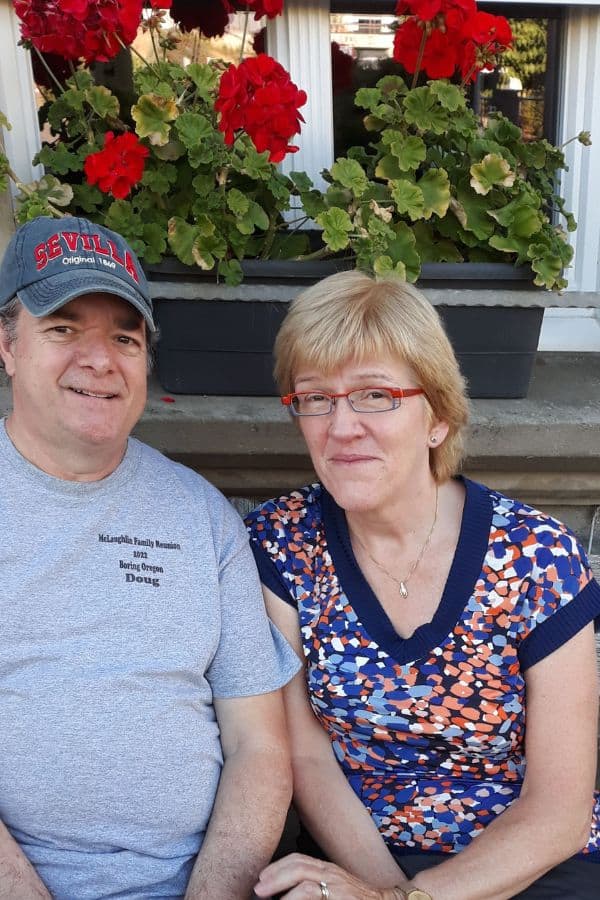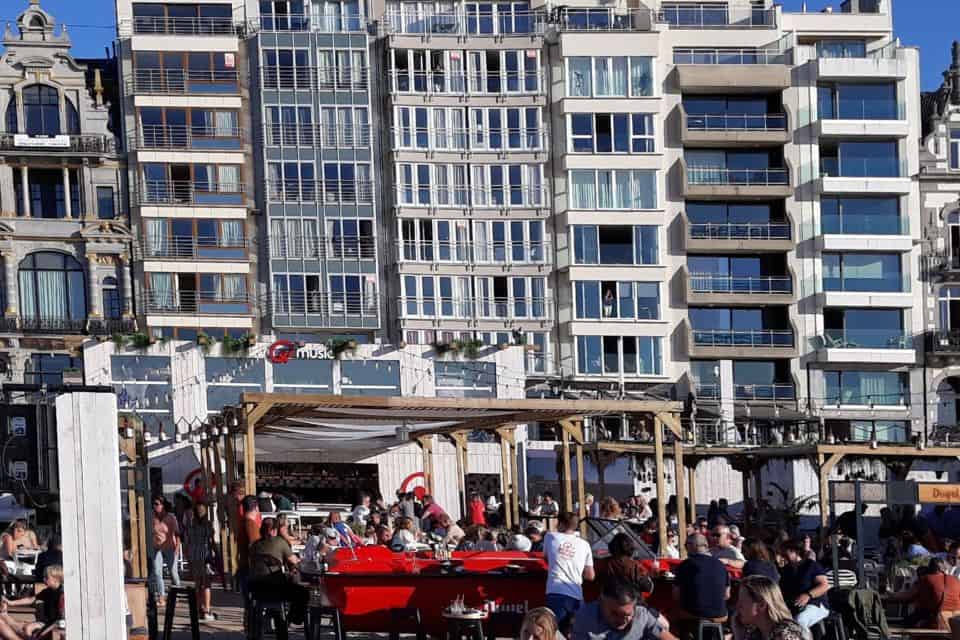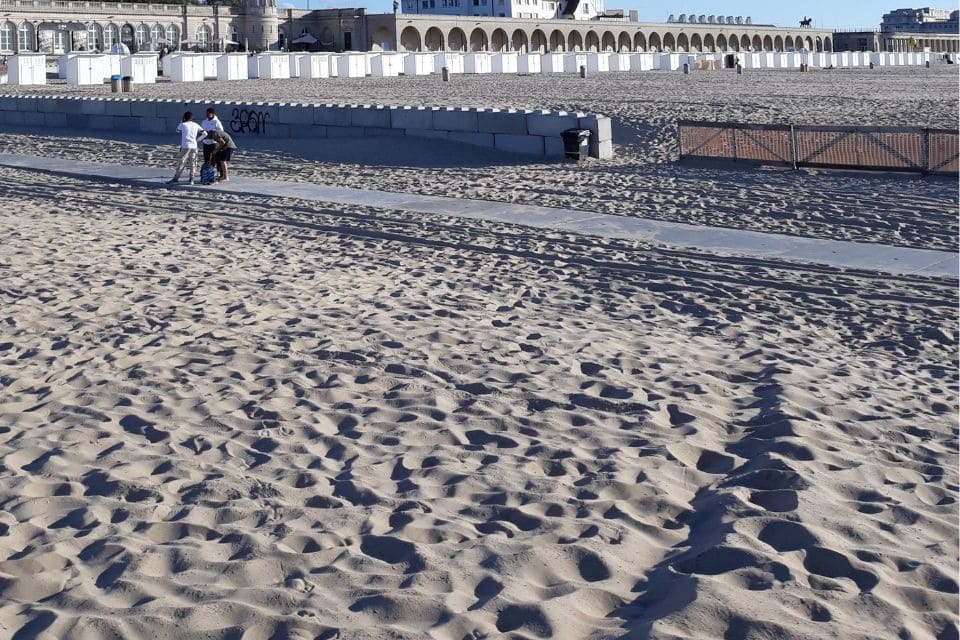
Ever thought about retiring by the beach . . . in Belgium? Navy retiree Douglas Craig did just that. He is now fully retired in the seaside town of Ostend after living and working in Belgium for a decade. While the country is not a typical retirement destination, it has many positives that make it the place Douglas plans to spend the rest of his life.
In this personal Q&A, part of our Expat Military Retiree Interview Series, learn how Douglas ended up in Ostend, why he was able to build a great life there, and what aspects of Belgium may prompt you to consider it for your own retirement or post-military career!
How did you end up retiring in Belgium?
I retired from the Navy in 1998. I never visited Europe until after I retired.
I worked as a US Marine Corps contractor from 1998 until 2012. From 2007 – 2012, my contract sent me to work at US Marine Corps Forces Europe/Africa Headquarters in Stuttgart Germany.
While there, I explored Europe and met my wife, Patricia, who is from Belgium. We married in 2011 and registered our marriage in her hometown in Ostend, Belgium after I lost my job in Germany in 2012. Otherwise, without SOFA status I could not stay in Europe. Due to family reasons my wife did not want to leave Europe, so we decided to move to Belgium.

What was the process for obtaining family reunification status in Belgium?
The city hall took my application for family reunification and issued a temporary paper “F” card, giving me the legal permission to live in Belgium. Six months later I was issued my plastic “F” card, which also allowed me to travel in Europe with the card along with my US passport.
In my first week I was required to join a medical mutuality giving me basic medical coverage. I was also required to apply for a Belgium integration course and given information on where to begin learning Dutch. I live in Flanders, so the process could be somewhat different for those settling in Wallonië or Brussels.
I signed up almost immediately, and because I had studied Dutch, I passed the 1.1 test and started at level 1.2. We had savings and my wife had income, so I was able to attend Dutch classes two days per week and study on other days. I was eligible to work with my “F” card but chose to wait, as we were okay financially.
Note from Poppin’ Smoke: the Belgium Immigration Office website has more details about family reunification and other types of visas for moving to Belgium.
Did you ever work in Belgium?
In 2014 I began my search for a job and initially saw that my military IT skills did not match the local job market demand for IT skills. I sought help from the Flemish work agency, and they arranged for me to attend a Windows System Administrator course to update my skills.
After the course I successfully applied for work and began my career in Belgium. I soon shifted to a software testing engineer position. To make this career shift, I took a week- long Certified Tester course in England, only a six hour drive away.
This led to a new job and a promotion to testing software for medical devices, working alongside recent international graduates from University of Ghent. I was back in a primarily English-language workplace.
My last employment was with another international workplace, Barco NV, where I was a QA engineer for cloud software. I retired from Barco in 2023.
So, in addition to my military retirement and US social security, at the age of 62 I have also earned a small Belgium pension.

Does Belgium tax your military retirement or Social Security?
Not my Social Security, but Belgium does tax the retirement income of all citizens residing in Belgium (residence-based taxation). Since I became a dual citizen in 2019 I pay taxes on my military retirement to Belgium.
I exclude my military retirement from my US taxable income with IRS form 8833, explaining the tax treaty provision for this “re-sourcing of income”. The IRS has processed such returns with no problem. So, I have successfully avoided double taxation.
Do you speak Dutch? If not, is it difficult to navigate daily life?
Yes, I speak Dutch. In general I only find regional dialects difficult to understand but I am learning West Flemish where I live. (Flemish is the language of Flanders. It is similar to Dutch but with different word choices).
I watch TV and listen to the radio in Dutch, and I try to watch the local news and weather daily. I still like to read US and UK news for other perspectives.
Movies in Flanders are played in English with Dutch subtitles, instead of being dubbed into French, like in the French-speaking part of Belgium. The language is not so difficult to learn here. Adult continuing education is inexpensive, too. I learned one level of French from Dutch!
English is widely understood in Flanders and it’s possible to get jobs in English. Flemish government language training and job training are awesome.
Everyone who wants to work can find work, plus you can earn an additional government pension from Belgium.

How does the cost of living in Belgium compare to the US?
I visit the US, on average, once every five years and find that Belgium prices have become cheaper in comparison to US prices over time. Especially my last visit to the US in August 2022; I had sticker shock.
My grocery shopping habits have changed a lot. I eat a lot more fresh fruit and vegetables. I buy fresh meat from a butcher and cheese from a cheese counter in a local supermarket: real Gouda cheese, Camembert, farmer sausages, free range farm eggs, and so many other fresh items unattainable in America.
I struggle to compare because of the quality difference; Belgian food is of the highest standards. For such quality we may pay a little more, but I think it is well worth it! We get some of the best foods from all over Europe: Parma ham; Spanish chorizo; German sausages; Dutch, French, or Italian cheese; French vol-au-vent; Dutch fish; Norwegian salmon; Balkan raspberries and blackberries; and Belgium apples and pears.
I pay 3 or 4 € for a beer. I have solar panels on my roof and warm my house with wood pellets and gas. I pay about 150 euros per month in the winter and 75 the rest of the year. Water is about 30 euros per month.
For exact prices of common items I suggest looking up Numbeo.com. Some other examples (in euros):
- Canned tomato blocks: 0.63
- Mussels 2kg package: 8.59
- Yogurt: 4 servings for 1.09
- Chocolate ice cream, 1kg: 1.99
- Tub of margarine: 2.35
- Box of long grain rice: 0.89
- Brown round bread at the supermarket: 1.79
- 500g name brand coffee: 7.49
- 500g chicory: 2.49
Typical rent for a two-bedroom apartment varies but is at least 800 euros per month. To buy such an apartment is at least 250k, but older row houses are a bit cheaper and offer more room.
Belgians, in comparison with much of Europe, have a higher homeownership rate and also enjoy relatively larger houses. My wife and I live alone in a 1200 sq. ft row house on a quiet residential street.
Dinner for two at a restaurant really depends. A day menu (lunchtime) is as low as 15 euros per person, but the dinner menu price for such a meal is around 35 euros per person. I once paid 75 euros per person at a very nice restaurant for a very special occasion, not including alcohol.
Coke is about 3 euros, and free refills do not exist except at a few American-style fast food restaurants.

How is the health care in Belgium? Do you have a Belgian insurance plan?
I use a medical mutuality called the “CM” and have extra hospital insurance through my wife’s work. I don’t use or need TRICARE here.
I can easily book an appointment with my house doctor online and with a specialist at the hospital. No referral is needed for specialist care in Belgium. There are wait times for certain things, such as one month for a routine MRI scan. I won’t disclose my exact insurance premiums, but combined I pay less than 100 euros per year.
I had a heart valve operation in 2016. I paid the equivalent of about $100 for the food I ate during my hospital stay. I had world-class top notch medical care and have no regrets leaving the TRICARE system.
Tell us about daily life in the town of Ostend.
Ostend is a lively beach tourist city with lots of fine restaurants and cafés. It’s super easy to get around on foot or bicycle, and Flanders has a fantastic bike path and trail system.
I have a row house built in 1931 and I enjoy remodeling rooms and touching things up. Last week my wife and I installed a new composite façade on an exterior wall.
Monday afternoons I go with my wife to a public art studio, where I paint in acrylic on canvas.

Our recent Sunday outing was at the sea dike in Middelkerke where we saw a gathering of over 100 US Ford Mustangs from 1966 to the latest models. It was really quite a thrill to see so many Mustang enthusiasts in one place in Belgium.
I am lucky to live near so many shops at the edge of Ostend, but if I need to go in the city I can ride my bike or take a bus.
There is a bus stop a 5-minute walk from my house. I buy a 10-pack of tickets in my mobile phone and activate one before boarding the bus. The ride to the city center is about 10 minutes and costs 1.70, which is why I usually ride my bike. The bike ride also takes about 10-15 minutes.
Do you have many friends from the local population, or do you primarily socialize with other expats?
My friends are all from the local community, I have pretty much integrated into the local culture.
There are many more Americans living around Mons and Brussels in support of NATO, but I live far from there. I go there mostly for DEERS enrollment support and to visit the exchange and commissary at Chievres AB (three or four times per year).
What do you like about living in Belgium?
Belgium, like anywhere else, has flaws, but home is where the heart is, and my heart is in Belgium. I feel welcomed and people seem happy to practice their English on native speakers here in Flanders.
What are some of the challenges of living in Belgium?
Ostend has mild winters but be prepared for days of rainfall and then more rain. I once lived in San Diego and the climate here is much more like Seattle. If you like Seattle weather without mountains to look at, then the Belgian North Sea coast might be for you.
The surf is very rough and not really a place to swim. We have swimming centers for that. Fishing is sad here. I’ve seen 50 Belgians “fishing” in a pond smaller than a football field.
If you are a sporting enthusiast, you will probably need to leave your guns in the US.
Constitutional rights that we, as Americans, take for granted are less absolute here.
What advice would you give to anyone who is thinking of moving to Belgium?
Come for the good food and drink or for love, but Belgium is not for everyone. It is not the cheapest place to live, but the healthcare is top notch and compares favorably in that regard with the British NHS.
If you are a digital nomad or work remotely you have top quality infrastructure and fiber internet. Unlike some lesser-developed countries, I never lost power unexpectedly in Belgium.
I studied Dutch online before arriving, which helped a lot. I was also debt free and had savings, which was helpful during the period when I was not working.
What are your longer-term plans? Do you intend to live in Belgium for the foreseeable future?
I will live until I die in Ostend. In the case there is a day where, due to my health, I can no longer live at home, then I know I can be admitted to a public old folks home where I can live out my days. I have heard stories of Belgians retiring in Spain or other parts of Europe, and they generally all come back for end of life care here.
* * *
What’s most important in your next phase of life?
For anyone looking for an overseas adventure in the next phase of life, whether to continue your career or to retire, Douglas highlighted some great “pros” of Belgium: excellent health care; high quality food and ingredients; solid infrastructure; reasonable costs relative to the US; and, for those who want and are eligible to work, job opportunities in English. As a bonus, you have easy access to the rest of Europe!
If Douglas piqued your interest, check out the Belgium Immigration Office website to learn more about visa options.
Still exploring your options? Check out the rest of our Expat Military Retiree interviews.
Remember, before you move to any foreign country, make sure you’ve done your research and can answer these important questions about your potential new home!
